|
|
|
Sort Order |
|
|
|
Items / Page
|
|
|
|
|
|
|
| Srl | Item |
| 1 |
ID:
173227
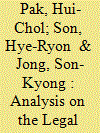

|
|
|
|
|
| Summary/Abstract |
At present, some states are undertaking military interventions in different parts of the world, contending the ‘legitimacy’ of their i006Evocation of responsibility to protect civilians from a humanitarian crisis. Discussions at international forums concerning the concept of Responsibility to Protect (R2P) are inconclusive about its legal nature and application. While some scholars and states support the doctrine of R2P as being legitimate, others challenge or take a rather sceptical view. Divergent views seem to be originating from its incompatibilities with the rules of international law, including the Charter of the United Nations. What is controversial is that the supporters of R2P are mainly from the West, while objections to R2P are from developing countries mainly from West Asia or Africa. This raises concerns about the possibility of future applications of R2P in any of the countries in these regions or other developing countries. The article, analyses the legal nature of R2P in terms of the main principles of international law and other sources of international law and argues that the legitimacy and international legal effect of R2P are uncertain.
|
|
|
|
|
|
|
|
|
|
|
|
|
|
|
|
| 2 |
ID:
169245
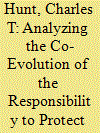

|
|
|
|
|
| Summary/Abstract |
This article analyses the Responsibility to Protect (R2P) in conjunction with the Protection of Civilians (POC) in peace operations. It examines where and how the two concepts have challenged, altered, led to reinterpretations and had feedback effects on each other. Drawing on methods from discourse analysis, the article examines their: gradual institutionalization at the United Nations (UN); deployment in the practices of the Security Council; and, influence over the actions of operations in the field. The analysis shows that the R2P has co-evolved with POC and particularly the implementation of POC through UN peace operations. The article illustrates that the emergence of the R2P and the trends in POC in peace operations have cross-fertilised in discourse and practice at the UN regarding the prevention and response to egregious of human rights abuses. It argues that this has influenced their respective trajectories with ramifications for understanding the normative trajectory and status of the R2P as it enters its third decade in popular lexicon. In particular, it posits that understanding the current and future status of the R2P will be enhanced by insights into how the R2P has shaped, but also been shaped by, other contiguous normative agendas, thematic areas and practices.
|
|
|
|
|
|
|
|
|
|
|
|
|
|
|
|
| 3 |
ID:
105948
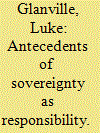

|
|
|
|
|
| Publication |
2011.
|
| Summary/Abstract |
Notions of 'sovereignty as responsibility' and 'the responsibility to protect' are often fra-med as radical departures from the 'traditional' conception of sovereignty. Many assume that sovereignty has, until recently, entailed only rights and not responsibilities. In con-trast, this article argues that sovereign authority has been understood to involve varied and evolving responsibilities since it was first articulated in the 16th and 17th centuries. It then traces the historical emergence of the tension between the right of sovereign states to be self-governing and free from outside interference and their responsibility to secure the safety of their populations. It cautions against a simplified story of 'traditional' sovereignty which reifies supposedly concrete and ahistorical rights of sovereigns while casting sovereign responsibilities as a morally abstract and late-arriving challenge.
|
|
|
|
|
|
|
|
|
|
|
|
|
|
|
|
| 4 |
ID:
110193
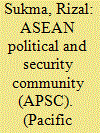

|
|
|
|
|
| Publication |
2012.
|
| Summary/Abstract |
Members of the Association of Southeast Asian Nations (ASEAN) took part in the World Summit 2005 and agreed to adopt the principle of Responsibility to Protect (R2P). However, there has not been any significant effort to discuss how the R2P might be applicable to the region and the issue remains a marginal one to ASEAN. However, the adoption of the ASEAN Political-Security Community (APSC) by ASEAN could provide a logical start for the maintraiming of R2P in ASEAN's discourse and practice. Some elements of the APSC appear to have characteristics in common with the R2P principle. While the APSC may provide broad and indirect support for building the capacity of States to recognise, prevent and respond to the situations of conflict, its immediate utility for preventing the four crimes of genocide, ethnic cleansing, war crimes and crimes against humanity nonetheless remains to be seen.
|
|
|
|
|
|
|
|
|
|
|
|
|
|
|
|
| 5 |
ID:
151647
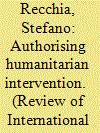

|
|
|
|
|
| Summary/Abstract |
Even scholars who support multilateralism in principle frequently question the value of securing approval from existing multilateral bodies for humanitarian intervention. The United Nations (UN) and regional organisations such as NATO, the argument goes, are far from democratic; furthermore, multilateralism is often a recipe for doing nothing; therefore, unauthorised intervention should be permissible in circumstances of ‘humanitarian necessity’. This article maintains that although today’s multilateral organisations and related procedures for authorising armed intervention may be suboptimal, they have significant output legitimacy. First, existing authorisation procedures reduce the risk of destabilising conflict spirals among powerful states. Second, they diminish the likelihood that humanitarianism will be used as a pretext. Third, they reduce epistemic problems concerning the identification of a just cause for intervention and thus the risk of accidental abuse. Fourth, they minimise the ‘moral hazard’ of humanitarian intervention. Finally, compliance with multilateral procedures is increasingly required for successful peacebuilding. This leads me to conclude that humanitarian warfare should always be authorised by the UN or regional multilateral organisations.
|
|
|
|
|
|
|
|
|
|
|
|
|
|
|
|
| 6 |
ID:
093776
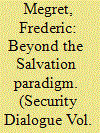

|
|
|
|
|
| Publication |
2010.
|
| Summary/Abstract |
The emergence of the idea of a 'responsibility to protect' has dominated debates about what should be done to stop atrocities. I argue that, despite notable progress, R2P remains embedded in a vision of 'international' rescue as primarily coming from outside, and as such ends up neglecting the very real and often much more decisive role that 'people' - individuals, civil society, resistance movements - have had in protecting themselves. I argue for a rehabilitation of the role of resistance to atrocities, a better understanding of how the international intervention paradigm may affect it, and a new understanding of the proper role of the international community - one of helping people to help themselves in the face of massive violence.
|
|
|
|
|
|
|
|
|
|
|
|
|
|
|
|
| 7 |
ID:
144465
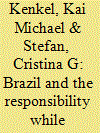

|
|
|
|
|
| Summary/Abstract |
This article examines Brazil's responsibility while protecting (RwP) initiative as an example of norm sponsorship available to nonpermanent members of the Security Council. After setting the stage with Brazil's historical engagement with intervention issues, it discusses the reasons behind the Brazilian initiative. It examines RwP's key proposals and the reactions they generated. RwP's normative implications are discussed, together with an examination of the main reasons why Brazil's sponsorship of the initiative waned following its exit from the Council. Brazil's withdrawal from sponsoring RwP highlights the need for ongoing support for initiatives that seek to revive the international community's intervention practices by tackling the basic tenets of discord over R2P's implementation.
|
|
|
|
|
|
|
|
|
|
|
|
|
|
|
|
| 8 |
ID:
160812
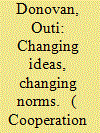

|
|
|
|
|
| Summary/Abstract |
Whilst much has been written on emergence of new norms in international politics, we know significantly less about changes to the ideas and assumptions that underpin such norms. Examined at micro-level, most norms consist of a set of ideas and assumptions that form the basis of what is considered as appropriate, legitimate or even the required thing to do. Far from being stable, ideational constitutions of norms can undergo significant changes in the course of the norm emergence process. Enquiring into such changes is important if we are to move beyond static and linear accounts of norm evolution. Using changes in the ideational constitution of the responsibility to protect – specifically, the de-emphasis of the responsibility to rebuild – as its vantage point, the analysis seeks to answer the following question: what drives change in ideational constitutions of international norms? The chief argument advanced in this article is that misalignments at the level of broader normative structures (external misalignments) and within norms (internal misalignments) result in changes in the ideational constitutions of emerging norms.
|
|
|
|
|
|
|
|
|
|
|
|
|
|
|
|
| 9 |
ID:
147603
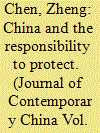

|
|
|
|
|
| Summary/Abstract |
This article investigates the Chinese government’s evolving policies toward the emerging global norm of ‘responsibility to protect’ (R2P). While its principle of non-interference persists, Beijing has gradually acknowledged the responsibility to respond to humanitarian catastrophes in certain circumstances. Meanwhile, to ensure the concept’s limited application and reducing the instances where it might breach state sovereignty, Beijing actively participated in relevant debates to shape R2P in a direction that gives primacy to capacity-building and preventative measures. After examining how China engaged with the R2P in the recent crises in Darfur, Libya and Syria, the article argues, perceived threat from R2P upon its regime security explains Beijing’s continued efforts to constrain the norm’s development, while its aspiration for a status of responsible power encourages the Chinese government to engage with R2P more actively and flexibly. The case of R2P thus sheds new light on the complex interactions between China and the evolving global order.
|
|
|
|
|
|
|
|
|
|
|
|
|
|
|
|
| 10 |
ID:
161615
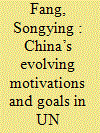

|
|
|
|
|
| Summary/Abstract |
This brief examines how the motivations and goals of China’s participation in United Nations (UN) peacekeeping operations have evolved since 1990 as a result of China’s changing national interests. We conclude that China is unlikely to abandon its long-held foreign policy principle of non-interference. However, motivated by a desire to be seen as a responsible global power, Beijing is seriously considering a more proactive approach to humanitarian crises, which may include direct intervention. Furthermore, as a significant contributor of troops and financing, China is uniquely positioned to represent the perspectives of both developing and developed countries in UN peacekeeping. To do so, Beijing will need to increase its leadership role in UN peacekeeping operations and offer creative ideas about how to promote reconciliation and development in post-conflict societies.
|
|
|
|
|
|
|
|
|
|
|
|
|
|
|
|
| 11 |
ID:
143923
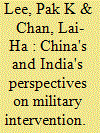

|
|
|
|
|
| Summary/Abstract |
This article addresses the puzzle for students of international relations as to why China and India, two major re-emerging powers in Asia, do not always baulk at military intervention invoked by Chapter VII of the United Nations Charter, while they rhetorically harbour strong reservations about it. The recent cases of Côte d'Ivoire (2011), Libya (2011), Syria (since 2011) and Mali (since 2012) show that both China and India acquiesced in external military intervention in these African countries plunged into brutal civil wars, with only intervention in Syria being rebuffed. By studying how they voted in the United Nations Security Council in 2011–12 and their discourses on intervention, including humanitarian intervention, this article examines why their decisions about intervention in Africa diverged from their decisions regarding intervention in Syria. The authors put forward the thesis that their behaviour can be explained by an interplay between norms and interests, in which they express a common anti-US liberal imperialist stance, shaped by a ‘collective historical trauma' and ‘post-imperial ideology', and demonstrate concerns for state failure and preferences for regional initiatives and political mediation to resolve civil wars.
|
|
|
|
|
|
|
|
|
|
|
|
|
|
|
|
| 12 |
ID:
161259
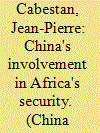

|
|
|
|
|
| Summary/Abstract |
China has been much more involved in Africa's economy and trade than in its security. However, over the past decade or so, China has increased its participation in the United Nation's Peacekeeping Operations (UN PKOs), particularly in Africa. It has also taken steps to better protect its overseas nationals and, in 2017, established a naval base in Djibouti. This article focuses on the participation of China's People's Liberation Army in the United Nation's Multidimensional Integrated Stabilization Mission in Mali (MINUSMA) since 2013. It aims to unpack the diplomatic process that led China to take part in this mission and to analyse the form of this participation. Mali was the second time (the first being in South Sudan in 2012) that China opted to deploy combat troops under the UN banner, underscoring a deepening involvement in PKOs and an increasing readiness to face risks. Finally, this article explores the implications of China's participation in the MINUSMA for its foreign and security posture as a whole. Often perceived as a realist rising power, by more actively participating in UN PKOs China is trying to demonstrate that it is a responsible and “integrationist” great power, ready to play the game according to the commonly approved international norms. Is this really the case?
|
|
|
|
|
|
|
|
|
|
|
|
|
|
|
|
| 13 |
ID:
138344
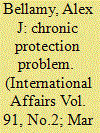

|
|
|
|
|
| Summary/Abstract |
The Democratic Peoples' Republic of Korea (DPRK) is arguably the world's most chronic abuser of human rights. In an unprecedented move, a Commission of Inquiry established by the UN's Human Rights Council accused the DPRK government of systematic violations of human rights amounting to crimes against humanity. In so doing, the Commission succeeded in putting human rights in the DPRK on the global agenda. Within months the UN's General Assembly and Security Council had joined the human rights body in examining the issue. This article explains the emergence of this new engagement with human rights in the DPRK, showing its relation to the ‘Responsibility to Protect’ principle. It charts the growing sense of frustration felt at the lack of progress on human rights in DPRK and shows how this was manifested in the General Assembly's decision to pursue the Commission's recommendations and call on the Security Council to take concrete steps. Despite this, however, the article shows that there are powerful obstacles in the way of a more robust international approach to human rights in the DPRK and counsels a less confrontational approach focused on engaging China and building trust within the Security Council.
|
|
|
|
|
|
|
|
|
|
|
|
|
|
|
|
| 14 |
ID:
146114


|
|
|
|
|
| Publication |
New Delhi, Oxford University Press, 2016.
|
| Description |
x, 267p.hbk
|
| Standard Number |
9780199467501
|
|
|
|
|
|
|
|
|
|
|
|
Copies: C:1/I:0,R:0,Q:0
Circulation
| Accession# | Call# | Current Location | Status | Policy | Location |
| 058723 | 341.7/JAC 058723 | Main | On Shelf | General | |
|
|
|
|
| 15 |
ID:
081547
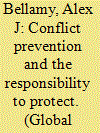

|
|
|
|
|
| Publication |
2008.
|
| Summary/Abstract |
Although the International Commission on Intervention and State Sovereignty identified the responsibility to prevent as the single most important aspect of its report The Responsibility to Protect, most scholarly and political attention has been given to the concept's reaction component rather than to its prevention component. This article aims to correct this imbalance by examining progress with, changes to, and attitudes toward the responsibility to prevent since the publication of the commission's report in 2001. It seeks to explain the relative neglect of prevention in debates about The Responsibility to Protect, arguing that the answer can be found in a combination of doubts about how wide the definition of prevention should be, political concerns raised by the use of prevention in the war on terrorism, and practical concerns about the appropriate institutional locus for responsibility. The article moves on to identify some basic principles that might help advance the responsibility to prevent
|
|
|
|
|
|
|
|
|
|
|
|
|
|
|
|
| 16 |
ID:
174655
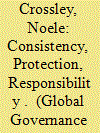

|
|
|
|
|
| Summary/Abstract |
Selective humanitarianism, it has been argued, may be condonable, or even preferable. Several arguments have been proffered in support of these views. This article revisits these arguments in light of the emergence of a discourse of protection and responsibility that now incorporates a wider spectrum of protection measures available to agents, of which armed intervention is but one. Consistency is an essential characteristic of ethics and the law—inconsistent practice diminishes the prospects of the development of norms of protection and associated practices and institutions. Furthermore, inconsistent practice means that fewer people receive protection from egregious violations of human rights. If the principles associated with human protection and humanitarianism are to become established norms of international society, international policy must be coherent, and international practice must be consistent.
|
|
|
|
|
|
|
|
|
|
|
|
|
|
|
|
| 17 |
ID:
164439
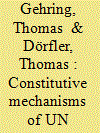

|
|
|
|
|
| Summary/Abstract |
Based upon the current debate on international practices with its focus on taken-for-granted everyday practices, we examine how Security Council practices may affect member state action and collective decisions on intrastate conflicts. We outline a concept that integrates the structuring effect of practices and their emergence from interaction among reflective actors. It promises to overcome the unresolved tension between understanding practices as a social regularity and as a fluid entity. We analyse the constitutive mechanisms of two Council practices that affect collective decisions on intrastate conflicts and elucidate how even reflective Council members become enmeshed with the constraining implications of evolving practices and their normative implications. (1) Previous Council decisions create precedent pressure and give rise to a virtually uncontested permissive Council practice that defines the purview for intervention into such conflicts. (2) A ratcheting practice forces opponents to choose between accepting steadily reinforced Council action, as occurred regarding Sudan/Darfur, and outright blockade, as in the case of Syria. We conclude that practices constitute a source of influence that is not captured by the traditional perspectives on Council activities as the consequence of geopolitical interests or of externally evolving international norms like the ‘responsibility to protect’ (R2P).
|
|
|
|
|
|
|
|
|
|
|
|
|
|
|
|
| 18 |
ID:
178552
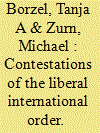

|
|
|
|
|
| Summary/Abstract |
The 1990s saw a systemic shift from the liberal post–World War II international order of liberal multilateralism (LIO I) to a post–Cold War international order of postnational liberalism (LIO II). LIO II has not been only rule-based but has openly pursued a liberal social purpose with a significant amount of authority beyond the nation-state. While postnational liberal institutions helped increase overall well-being globally, they were criticized for using double standards and institutionalizing state inequality. We argue that these institutional features of the postnational LIO II led to legitimation problems, which explain both the current wave of contestations and the strategies chosen by different contestants. We develop our argument first by mapping the growing liberal intrusiveness of international institutions. Second, we demonstrate the increased level and variety of contestations in international security and international refugee law. We show that increased liberal intrusiveness has led to a variety of contestation strategies, the choice of which is affected by the preference of a contestant regarding postnational liberalism and its power within the contested institution.
|
|
|
|
|
|
|
|
|
|
|
|
|
|
|
|
| 19 |
ID:
140415
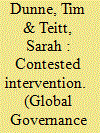

|
|
|
|
|
| Summary/Abstract |
This article examines institutional patterns of leadership and followership in the UN Security Council with respect to the Responsibility to Protect principle. In a departure from existing literature on leadership and followership in international relations, which has hitherto been framed within a realist analysis, the article presents a constructivist account of leadership that sheds light on the strategies and scope of conditions for mobilizing international action to protect populations from mass atrocities. The article applies a theoretical innovation to case studies that examine strategies that India and China adopted in the Security Council to respond to the crises in Libya and Syria from 2011 to 2013. This integration of theory and empirics reveals a complex and layered account of factors that shape the Security Council's ability to exercise its Responsibility to Protect. In doing so, the article demonstrates that followership and leadership are relational practices that create or limit the possibilities for institutional action.
|
|
|
|
|
|
|
|
|
|
|
|
|
|
|
|
| 20 |
ID:
145109
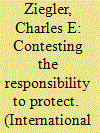

|
|
|
|
|
| Summary/Abstract |
This article explores the responsibility to protect (R2P) as a contested norm through a detailed study of the position of one major power—Russia—and brief consideration of those of the remaining BRICS. Although Russia's position on R2P has been toward the extreme end of the oppositional spectrum, Russia's concerns about the implementation of R2P are reflected in statements advanced by other BRICS members. Non-Western perspectives on the R2P are explored through the evolution of Russian foreign policy responses to R2P over three periods: from NATO's bombing of Yugoslavia to the UN Summit in 2005; from 2005 to 2011, when Moscow misapplied the R2P norm in the Russo-Georgian war; and the debates in 2011–2013 over R2P in the Libyan and Syrian cases. International pressure has been sufficiently strong to induce formal adherence to the norm of protecting vulnerable populations, though sovereignty issues and concerns about the implementation of R2P make internalization of the norm among non-Western states problematic in the near future.
|
|
|
|
|
|
|
|
|
|
|
|
|
|
|
|
|
|
|
|
|